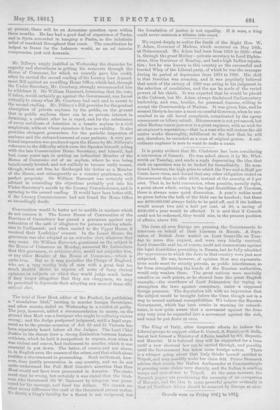Mr. Dillwyn amply justified on Wednesday the character for sagacity
and shrewdness in getting his measures through the House of Commons, for which we recently gave him credit, when he carried the second reading of his Lunacy Law Amend- ment Bill against an unwilling Home Office, which had, through the Under-Secretary, Mr. Courtney, strongly recommended him to withdraw it. Sir William Harcourt, foreseeing that the vote, if taken, would certainly go against the Government, was forced virtually to unsay what Mr. Courtney bad said, and to assent to the second reading. Mr. Dillwyn's Bill provides for the gradual absorption of private asylums by the public, on the ground that in public asylums there can be no private interest in detaining a patient after he is cured, and for the submission of every certificate of detention iu a lunatic asylum to a civil magistrate, without whose signature it has no validity. It also provides stringent guarantees for the periodic inspection of asylums and the enfranchisement of sane patients. A very pro- found impression was produced upon the House by Mr. Dillwyn's reference to the difficulty which even the Speaker himself, acting with the late Conservative Home Secretary, and himself, had had, some years ago, in getting an influential Member of the House of Commons out of an asylum, where he was being injudiciously treated, and not unlikely to become really insane, though, when set free, he discharged his duties as a Member 'of the House, and subsequently as a country gentleman, with perfect propriety. Sir William Harcourt was certainly well advised in overruling the objections probably put into his Under-Secretary's mouth by the Lunacy Commissioners, and in agreeing to the second reading. It would have been better still, if the Lunacy Commissioners had not found the Home Office so exceedingly docile.


































 Previous page
Previous page